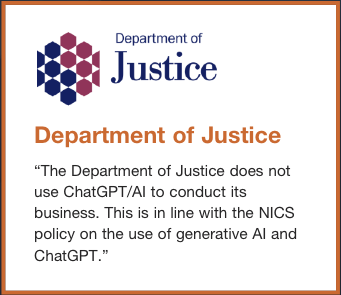AI in the public sector

Statements have shown that AI is an innovation which has a broadly collaborative and consistent approach between Northern Ireland Executive departments, following the publication of the NICS – Use of Generative AI guidance for civil service staff in June 2023.
Published in July 2023, the NICS – Use of Generative AI guidance aims to ensure a consistent approach on the use of Generative AI – ChatGPT across the Northern Ireland Civil Service (NICS). The Civil Service states that it “recognises the potential benefits of using artificial intelligence (AI) to improve efficiency and productivity in the workplace”. However, the NICS also states the importance of using AI “responsibly and ethically, particularly when it comes to generating content”.
With broad guidelines for the use of generative AI in place, there is a broad agreement in principles of the use of AI. However, its utilisation differs between departments.
agendaNi asked the following three questions to all nine Executive departments, as well as the Northern Ireland Office.
- Does the Department have guidelines regarding the use of AI by department officials?
- To what extent is the Department using ChatGPT or other artificial intelligence (AI) applications to conduct business?
- What is the Department’s rationale for the use of ChatGPT and/or other AI applications by officials?
 |
 |
 |
 |
 |
 |
 |
 |
 |
 |





